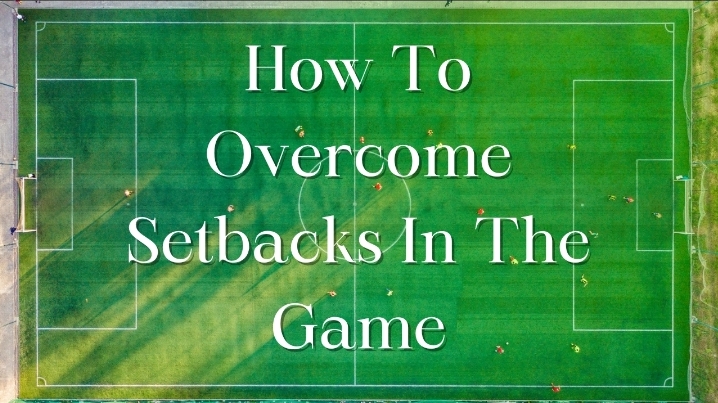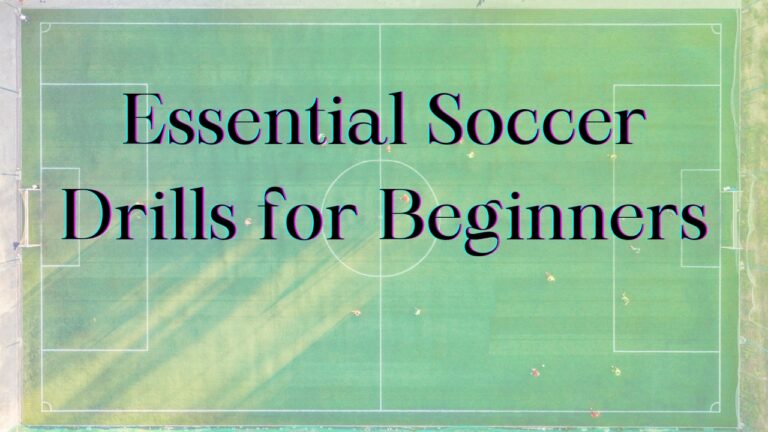Soccer, like any sport, has its fair share of setbacks and challenges. From injuries to tough losses to scoring droughts, obstacles are an inevitable part of the game. However, the most successful players and teams don’t let these hurdles stop them for long. What allows them to bounce back and achieve success? The answer often comes down to one word – resilience.
Resilience is the ability to overcome setbacks and adversity. It means persisting through difficult times to reach your goals. When you have resilience, you view challenges as opportunities for growth rather than defeats. Developing resilience is crucial for any soccer player striving for excellence. The good news is resilience is a skill you can build over time.
What is Resilience and Why is it Crucial in Soccer?
To understand why resilience is so key for soccer players, let’s first dive deeper into what it means to be resilient. At its core, resilience is about adapting well when faced with adversity, stress, or challenges. It’s the ability to bounce back and even grow stronger after going through difficult experiences.
Here are some common setbacks and adversities that soccer players need to be resilient against:
Injuries – From small hamstring strains to major ACL tears, injuries happen at all levels of soccer. Resilience helps players recover both physically and mentally.
Losses – No team can win them all. Resilience keeps players motivated after disappointment.
Getting cut – Tryouts and cuts are a reality in competitive soccer. Resilience helps players persist despite rejection.
Scoring droughts – All players go through periods of poor form. Resilience keeps them focused on improvement.
High pressure – Soccer comes with constant evaluation and pressure. Resilience provides the mental toughness to handle it.
The reality is soccer will test your resilience again and again. Players who cultivate this ability are the ones who go on to succeed long-term. Resilience turns obstacles into opportunities for growth. When you’re resilient, you don’t dwell on failures or setbacks. You can positively reframe challenges and quickly bounce back stronger than before.
1. Develop a Growth Mindset
One of the foundations of resilience is developing a growth mindset. This means viewing abilities and intelligence as something you can improve with effort and learning rather than fixed traits. People with a fixed mindset believe some people are naturally gifted at certain things while others aren’t. People with a growth mindset believe anyone can improve dramatically in any area with dedication and practice.
How does this relate to resilience? Players with a fixed mindset are quicker to get discouraged by setbacks. They see them as evidence they simply don’t have what it takes. Players with a growth mindset remain motivated despite challenges because they know with more effort they can improve.
Here are some tips for cultivating a growth mindset as a soccer player:
- Focus your attention on effort and learning rather than inherent talent. Judge yourself based on how hard you’re working.
- View failures and mistakes as opportunities to improve rather than signals you aren’t good enough. Ask yourself “What can I learn from this?”
- Remember that even the best players started out struggling. Greatness takes persistence.
- Praise yourself for strategies, effort, focus, and perseverance rather than results alone.
The next time you experience an obstacle on or off the field, avoid labeling yourself a failure. Instead, reframe it as a growth opportunity and part of your soccer journey. If you remain committed to learning, you will become more resilient with each challenge that comes your way.
2. Surround Yourself with Support
Facing setbacks and adversity is always easier when you don’t have to go through it alone. As a soccer player, one of the best things you can do is surround yourself with supportive people who will pick you up when you get knocked down.
Here are some examples of key supporters worth keeping close as you develop your soccer resilience:
Teammates – Teammates who support each other through ups and downs build resilience. Look for teammates who inspire you with their work ethic and positive attitude. Be that person for your teammates too.
Coaches – The right coaches provide guidance and reassurance when things get tough. Seek out coaches who build up your abilities rather than tear you down.
Friends and family – Never underestimate the value of emotional support from friends and family as you encounter challenges. Make sure to communicate and spend time with your support system.
Mentors – Seasoned players who have been through it all can provide invaluable advice and perspective. Seek out positive mentorship opportunities.
While resilience comes from within, the people around you can make it much easier or harder to overcome adversity. Make sure your inner circle lifts you rather than drags you down. Don’t be afraid to ask for help and support when you need it either. With the right team behind you, you’ll be able to bounce back from anything.
3. Foster Mental Toughness
Resilience requires more than just a positive mindset. Soccer players also need to actively develop mental toughness to overcome the sport’s daily challenges. Mental toughness allows you to stay focused, confident, and driven even when the going gets tough.
Here are some effective techniques for building mental toughness on and off the field:
Visualization – Visualizing yourself succeeding and achieving your soccer goals helps make them a reality. See yourself making that game-winning shot or getting back from an injury. Imagining the feeling of triumph is a powerful motivator.
Positive Self-Talk – Battle negative thoughts with affirming self-talk. When you make a mistake, don’t dwell on it. Tell yourself “I’ve got this!” or “Next play!” Refocus on the task at hand.
Mindfulness – Staying fully present, especially during competition, prevents you from being derailed by past errors or future worries. Use techniques like deep breathing to calm and focus your mind.
Overcome Fear – Feeling fear is normal, but letting it control you hampers resilience. Accept the emotion, then refocus on the challenge before you. Avoidance leads to more fear.
Developing true mental toughness and resilience takes commitment, but the payoff for your soccer performance is massive. Keep working to build your mental muscle the same way you build your physical strength.
4. Take Care of Your Physical Health
Playing soccer at a high level requires tremendous physical fitness, strength, and stamina. When your body isn’t properly cared for, it’s difficult to bounce back from the sport’s daily rigors. Taking care of your overall health goes hand-in-hand with developing resilience on the field.
Here are some ways to ensure your physical health enables you to overcome soccer’s challenges:
Train wisely – Follow smart, periodized training programs tailored for soccer. Work on strength, endurance, agility, and soccer-specific skills. Don’t overtrain to avoid burnout and injury.
Eat properly – Fuel your body with nutritious whole foods and proper hydration. Don’t neglect carbs for sustained energy. Supplement wisely if needed.
Rest and recover – Respect your body’s need for rest days, quality sleep, and active recovery. Listen to signals like fatigue or nagging pains.
Prevent injury – Strengthen at-risk areas, and address muscle imbalances. Learn proper movement mechanics. Know when to ease off.
Rehab diligently – If injured, faithfully follow your rehab program. Don’t rush back too soon. Build confidence incrementally.
Make your overall health and fitness a priority if you want to overcome soccer’s obstacles. Your resilience will directly correlate to how well your body is prepared for the demands of the sport. Respect your body and it will reward you in return.
5. Reframe Failures as Learning Experiences
Experiencing failures and setbacks is an inevitable part of competitive soccer. The key to building resilience is how you frame and react to these failures in your mind. Rather than viewing them as demoralizing defeats, reframe them as vital learning experiences.
Here is a constructive approach to analyzing your failures and turning them into growth opportunities:
Let go of ego – Check your ego at the door. Objectively assess what went wrong rather than making excuses. Take your emotions out of it.
Identify lessons – Ask yourself thoughtful questions to identify lessons like “What can I learn?” “How can I improve?” “What would I do differently next time?”
Focus on your effort – Evaluate aspects within your control like preparation, focus, and attitude. Don’t dwell on what you can’t control.
Forgive yourself – Avoid beating yourself up over failures. Remind yourself you’re human and refocus on improvement.
Make adjustments – Use the lessons to make positive changes, whether technical, physical, mental, or tactical. Then move forward.
Reframing failures as learning experiences are essential to developing resilience and reaching your soccer potential. Rather than crushing your confidence, let your failures fuel your growth.
6. Focus on Controllable Factors
In soccer, there are many factors entirely outside of your control. You can’t control the weather, the referee’s calls, how the other team plays, or even the final score at times. Dwelling on these uncontrollable factors is a surefire way to sap your resilience.
Instead, build your resilience by zeroing your focus in on what you can control:
Your effort – Regardless of what happens in a game, you can control how hard you work, hustle, and persist. Make an effort for your foundation.
Your attitude – You can’t always control events, but you can control your attitude and response. Choose positivity in the face of adversity.
Your preparation – Control your readiness through practice, fitness, hydration, nutrition, and rest. Don’t neglect preparation then wonder why you struggle.
Your focus – Where you place your focus is within your control. Dwell on past mistakes or future worries and your resilience will suffer. Stay focused on the task at hand.
Learning to zero in on controllable factors takes practice, but it’s a skill that builds resilience and performance. You can’t control everything, but you can control more than you think.
7. Remember Your Purpose and Motivation
When adversity strikes, it’s easy to lose sight of why you play soccer in the first place. Reconnecting with your deeper purpose and motivation provides fuel to power through challenges.
Here are some ways to tap into your soccer passion when you need some extra resilience:
Visualize your goals – Picture the player you want to become and the objectives you’re striving for. Keep your eyes on the prize, especially during hard times.
Reflect on your soccer journey – Remember all the work and sacrifice it took to get here. Let your gratitude for the opportunity drive you.
Watch inspirational videos – When you need a pick-me-up, watch old footage of yourself or players you look up to succeeding. Rekindle your inspiration.
Remember your fans – Think of your supportive family, friends, teammates, and coaches. Don’t let them down by giving up.
Have fun – Recapture the youthful joy that drew you to soccer in the first place. Enjoy the game and your motivation will follow.
By connecting with your core passion and motivation, you’ll have an unshakable reason to keep progressing. When the going gets tough, the resilient get going. Keep your soccer fire burning bright.
Conclusion
The road to excellence in soccer is filled with setbacks, obstacles, and adversity. Injuries, losses, cuts from teams, scoring droughts – challenges are guaranteed at all levels. True soccer greatness isn’t defined by an athlete’s physical talents alone. It requires tremendous resilience.
Resilience is the ability to rapidly rebound from disappointments and grow stronger in the process. Luckily, resilience is a skill that can be cultivated over time. With consistent effort towards developing a growth mindset, surrounding yourself with support, fostering mental toughness, taking care of your body, learning from failures, focusing inward, and connecting to your purpose, you can massively increase your resilience.
Relate Post: Developing a Winning Mentality in Soccer
Author






